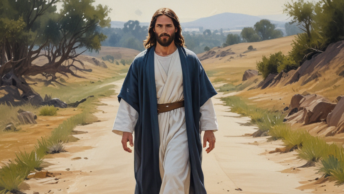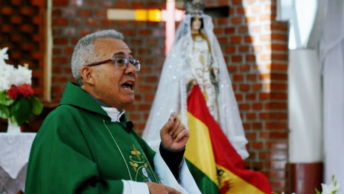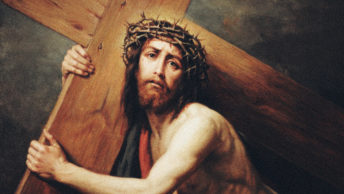An important 19th century preacher and religious leader named Henry Ward Beecher was famous for his eloquent oratory and his powerful opposition to slavery, and his words and example carried great influence in American society. As a boy, he learned an important lesson in school one morning—a lesson that stayed with him the rest of his life. The teacher called on him to stand in front of the class and recite that day’s lesson. Henry was a good student, so he stood up and confidently began to recite, but the teacher suddenly interrupted him by shouting “No!” Surprised by this, Henry paused for a moment; he thought he was reciting the lesson correctly, so he continued. However, the teacher again interrupted by shouting even louder, “No!” Henry was confused and humiliated, and sat down in silence. The teacher called on the next lad, and the same thing happened—except for one difference. This student kept on reciting, even after being interrupted several times, and when he was finished, the instructor exclaimed, “Very good!” Henry was upset, and complained, “I recited just as well as he did.” The teacher explained, “It is not enough to know your lesson; you must be sure of it. When you allowed me to stop you, it meant you were uncertain. If all the world says ‘No!’ it is your business to say ‘Yes!’ and then prove it” (homily notebook, “Commitment”).
This is what Jesus is talking about in the Gospel of Luke (14:25-33). It’s not enough merely to say “Yes” to Him; we must be sure we mean it, and then follow through. Christianity is not a religion of convenience, but of commitment; it’s not a code of conduct for Sundays, but for the entire week; it’s not just a set of beliefs, but a way of life. Jesus didn’t hold anything back, even to the point of giving His life for us, and He seeks this same type of wholehearted response from us.
The most important lesson any of us can learn—whether in school or in life—is our absolute need for God, and the importance of putting our relationship with Him at the very center of our lives. The Book of Wisdom (9:13-18) speaks of how true wisdom comes from the ways of God, not those of the world. The burdens and worries of this life do not bring true happiness; to find it, we need a higher purpose or meaning. This is beyond our grasp or understanding—but the Spirit of God can grant us wisdom and peace. If this is to happen, of course, we must take the time to listen to God—and, just as importantly, we must let His Word make a difference. St. Paul gives a specific example. Philemon (9:10, 12-17) was a wealthy man whom Paul had converted. He had a slave named Onesimus, who ran away and himself became a Christian. Onesimus asked Paul to write a letter to Philemon on his behalf, requesting that instead of being arrested and punished, he be granted his freedom as a brother in Christ. Paul did in fact write this letter for Onesimus, reminding Philemon that he had received a great gift of faith—and here was an opportunity to begin repaying it. We don’t know how Philemon responded, but Paul’s point was a valid one: if we believe in Jesus, this should make a real difference in how we treat others. In the Gospel of Luke (14:25-33), Our Lord isn’t telling us to ignore our duties to our families; rather, He is saying that our duty to God must come first—even when it’s difficult or inconvenient. Following Jesus is a serious matter, one requiring a certain amount of planning or reflection on our part. Christianity often involves sacrifice, and we need to be realistic and honest with ourselves about this truth.
A missionary in Africa made many converts, including a native boy. When the boy came to church one day, the missionary patted him on the back—and the boy winced. When the pastor asked what was wrong, the youngster showed him his badly bruised back, explaining that his father had been beating him. “Why?” the missionary demanded, and the boy answered, “My father beat me for becoming a Christian and coming here to church” (homily notebook, “Commitment”). This was a dramatic case of the world, represented by the boy’s father, saying “No”—and of a Christian saying “Yes.”
There are ways in which we too must stand up for our faith. For instance, we must ask ourselves whether it’s worthwhile to give God control of our lives. The world says “No,” but we must say “Yes”—for centering our lives around God by obeying His commandments, seeking His guidance, and loving Him and our neighbor is the only way to find true and lasting freedom and peace. Does it make sense to pray for our enemies and forgive those who wrong us? The world says “No,” but we must say “Yes”—for we know that we too are in need of mercy, and that we obtain it for ourselves by first extending it to others. Is there any real value in coming to church every weekend and being active members of the parish? The world says “No,” but we must say “Yes”—for here we experience God’s presence in our community, we receive the actual Body of Christ in the Eucharist, and are nourished by the proclamation of God’s Word. Should we show concern for the needs of others? The world says “No,” but we must say “Yes”—for Jesus assures us, “Whatever you do for the least of My brothers or sisters, you do for Me.” If our faith becomes difficult or inconvenient, should we hold onto it anyway? The world says “No,” but we must say “Yes”—for Jesus tells us that following Him means taking up our cross each day. We know that if we persevere, He will help us, that He can make us better and happier persons through our sufferings, and that we will one day share in His glory.
There was no such thing as a “truth in advertising” law back in the 1st century, but Jesus used this approach anyhow. He was completely honest with His prospective followers, and He gives the same warning and promise to us. Being His disciple is not easy, and nothing less than a wholehearted commitment will do. The only way we will ever influence the world, and enter into God’s Kingdom, is by taking our faith seriously. This can be difficult, but if we make the effort, Jesus will help us. The invitation is His; the choice is ours.








